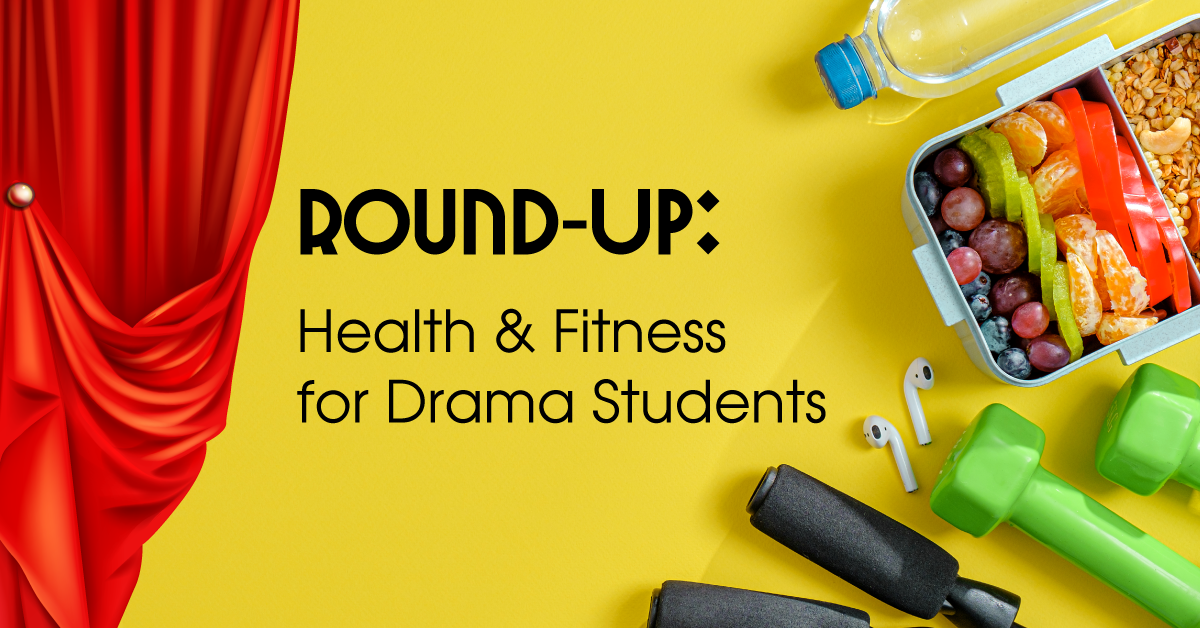Round-Up: Health & Fitness for Drama Students
Make no mistake: Drama class is not for the faint of heart. Creating theatre is physically and mentally strenuous and drama students need to be strong. Performing onstage and working backstage are demanding and require focus and endurance. In drama and theatre, your body is your instrument so you need to keep it “in tune.” For that, we’ve rounded up some great articles to help your students incorporate health and physical fitness into their routines. What are your best ways to help your students get strong and stay well?
Note: When discussing health and physical fitness, students should not feel that they have to lose weight, get toned, or change their body type to get roles or otherwise succeed in theatre. Fitness comes in all shapes and sizes. Focus on choices that help students to feel healthy, strong, and well, rather than on outward appearance.
- First and foremost, water. Most of us do not consume enough water despite having a multitude of fancy water bottles and mugs. Did you know that the average human body is 60% water? Water keeps our organs and cells healthy, and of course keeps us hydrated. Water keeps the vocal folds lubricated and helps them recover faster after heavy use. So when you need a pick-me-up, grab your water and take a big sip.
Why do we warm up before drama activities? Both to get us into the “drama mindset” and to ensure our bodies are in peak physical condition to leap, dance, twist, cavort, and every other wonderful and wacky movement that the director comes up with. Here are some physical warm-ups for you: 3 Fun and Physical Warm-Ups to Get Your Actors Moving: Doodles, Elephant Walk, and Puppet Dance Party.
As well, here are some physical, vocal, and mental warm-ups and tips, all in one article!
- Physical fitness is important for any drama student to work on their strength, flexibility, and endurance, which are necessary for both plays and musicals. Here are 3 Fitness Tips for Drama Students that are fun, or your students might enjoy dancing in the drama classroom, which is a great way to incorporate movement and physicality into the day.
- Vocal health is imperative, regardless of whether you are performing a musical or a play. Here are three tips for keeping your voice healthy, three MORE tips for keeping your voice healthy, and advice from teachers about teaching vocal safety to students.
- Here are some vocal exercises for your students: A Simple Breath Control Exercise for Actors & Singers, Projecting Your Voice Without Yelling, A Vocal Exercise for the Articulators, and Tips to Improve Enunciation. As well, here’s a troubleshooting guide for why your actor isn’t projecting their voice and tips for solving vocal projection issues.
- We say this to our students all the time, but it bears repeating: When it comes to showtime, it’s important to make smart choices. Things like getting a proper amount of sleep, eating nourishing food, avoiding screaming and screeching, staying away from risky activities where students might get injured, and wearing warm clothing in cold weather may not be fun in the moment, but will keep students healthy in the long run. Even though show week might feel like it speeds by, students need to stay well all the way from opening to closing!
- Mental health is just as important as physical health. If your students are feeling anxious or nervous, try some mindfulness techniques or establish some rituals like the show circle. Let your students know that your drama classroom is a safe space and encourage them to reach out if they need additional help.



